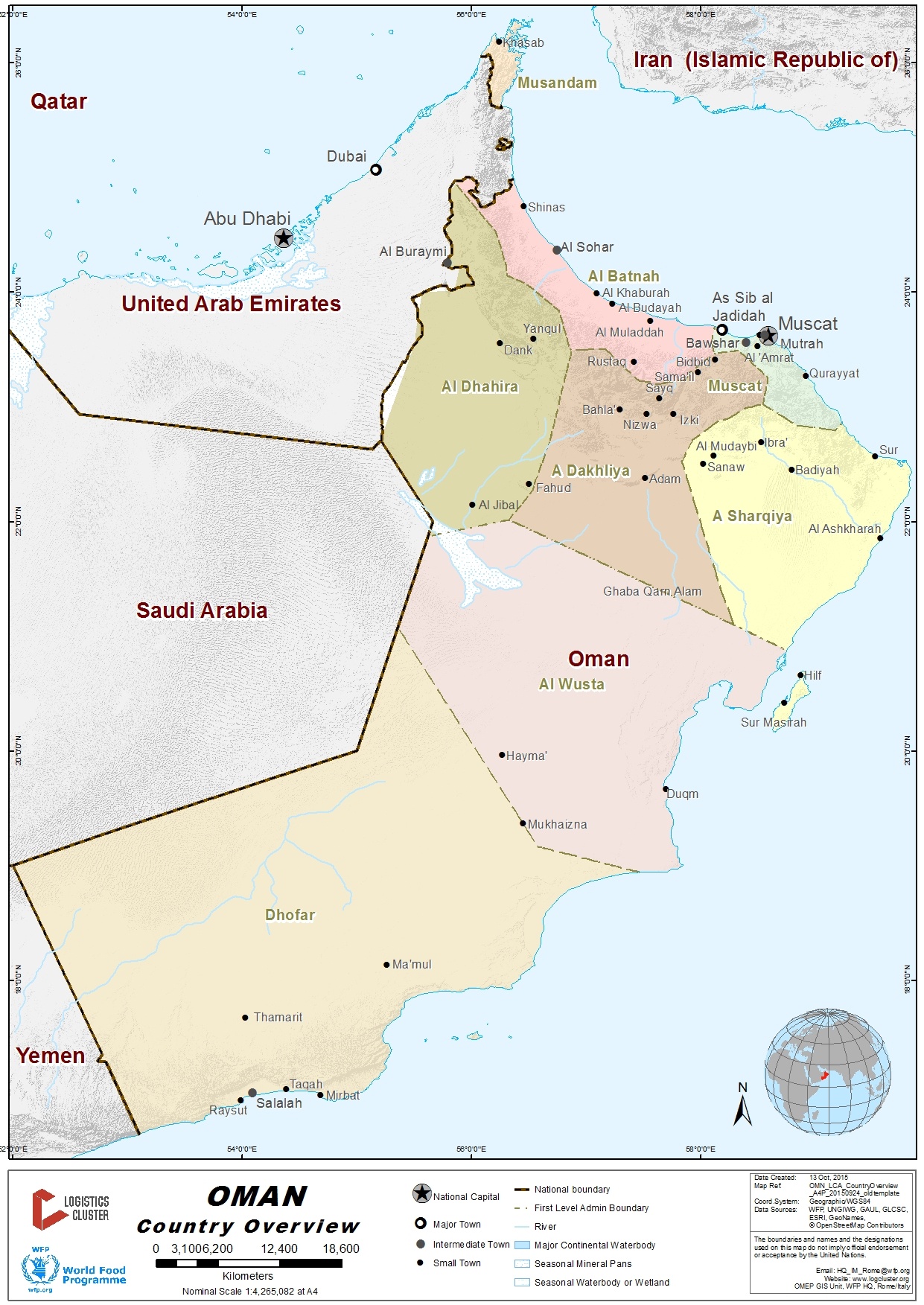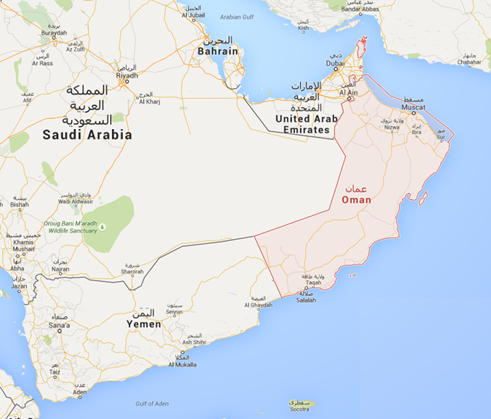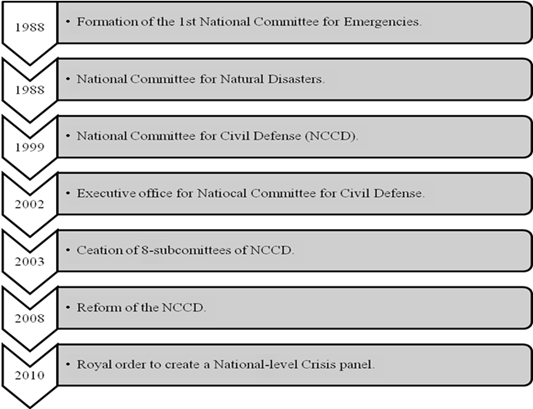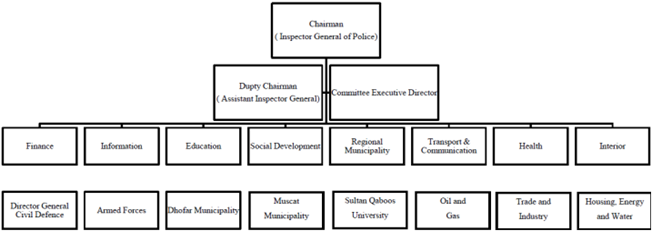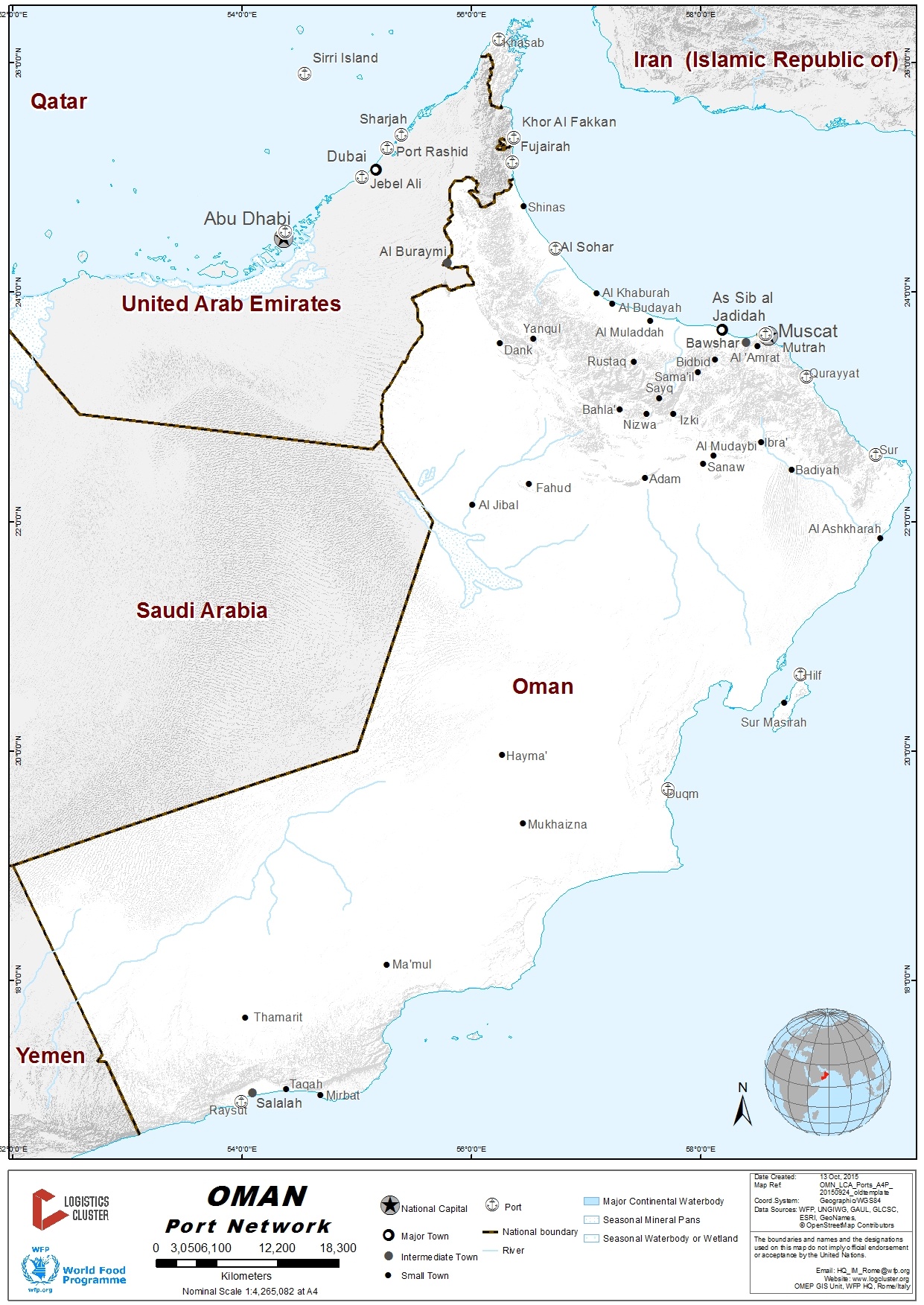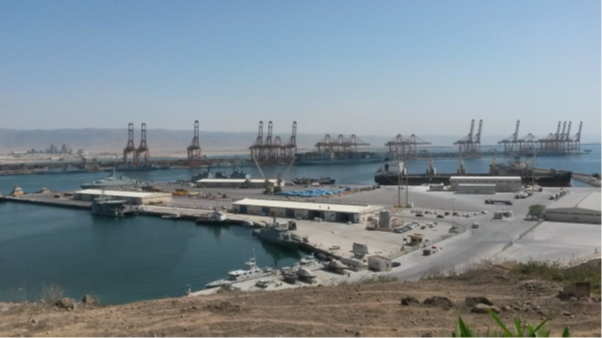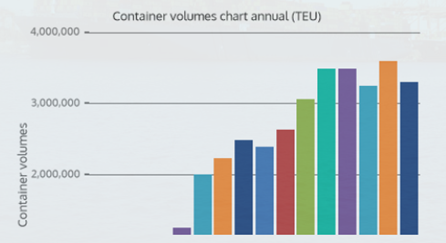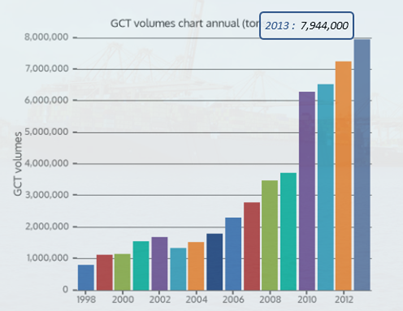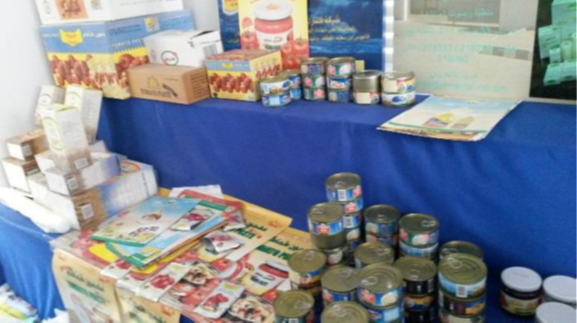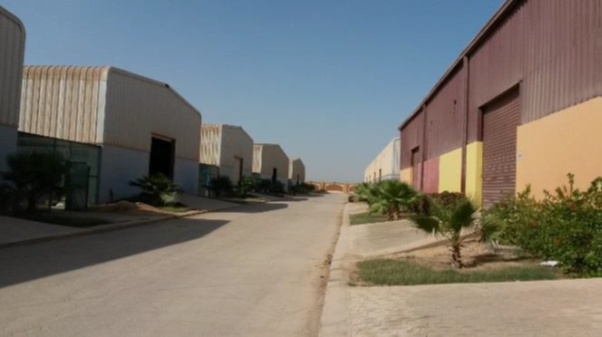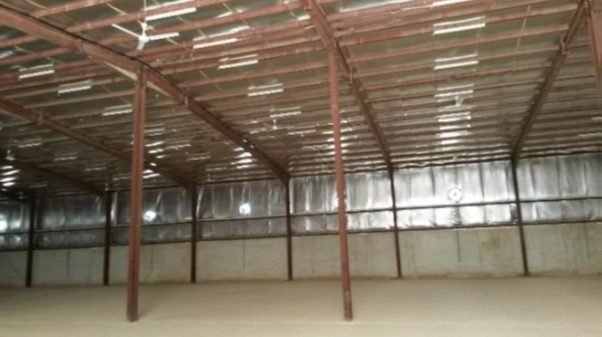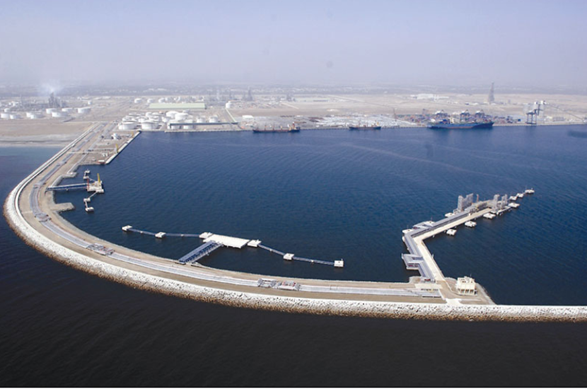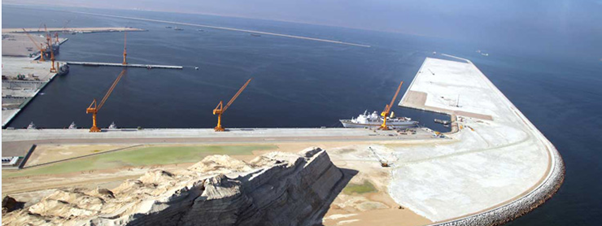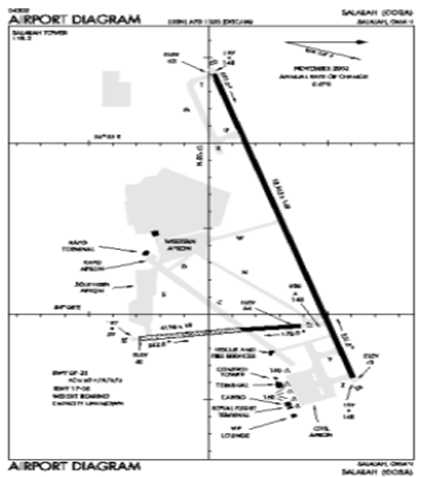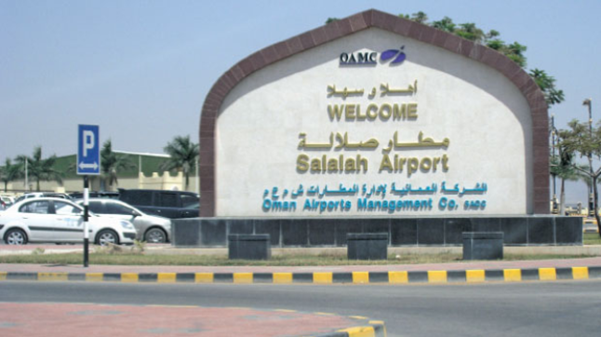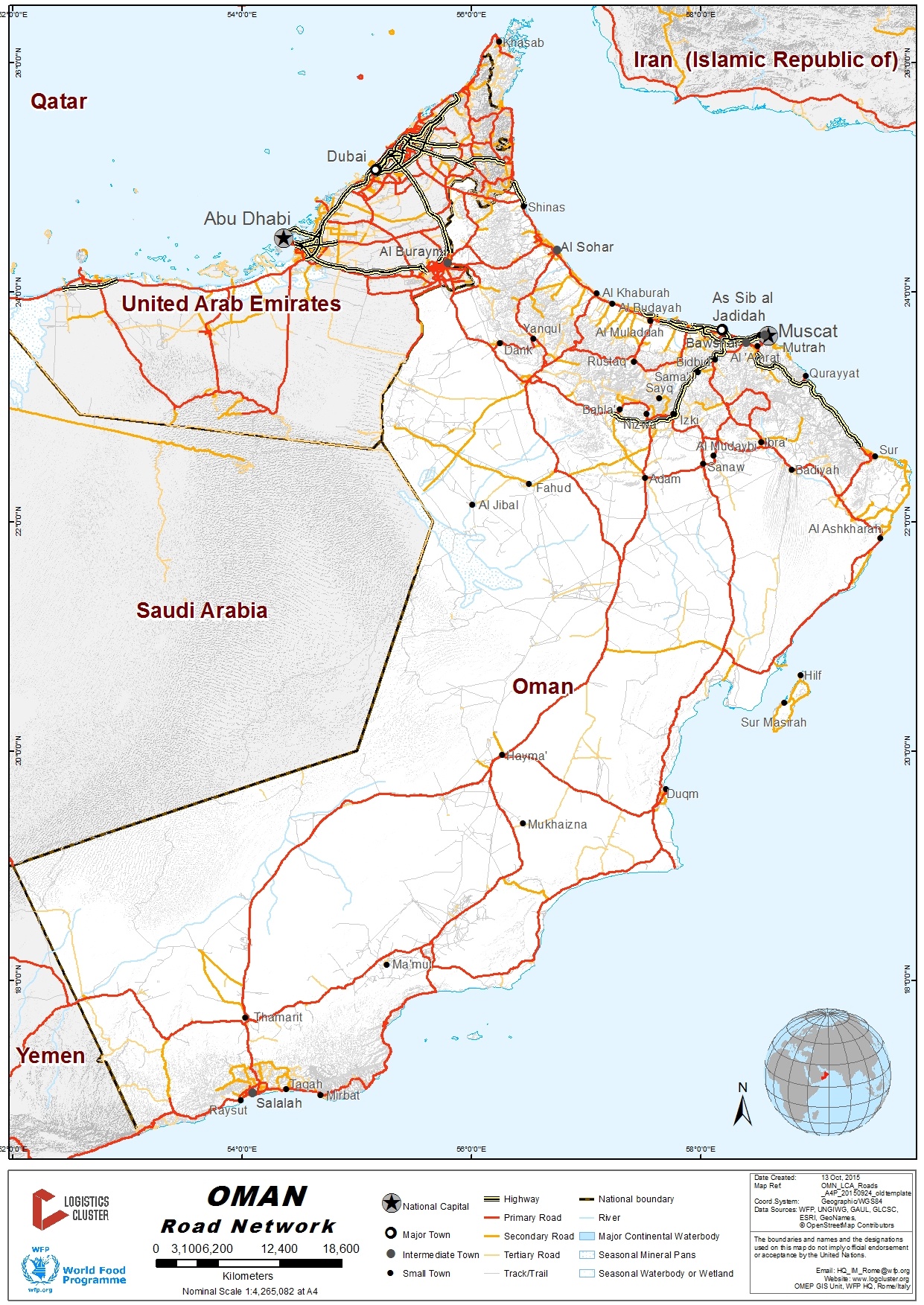Oman - Limited LCA
|
Country name: |
Sultanate of Oman |
|---|---|
|
Official country name: |
Sultanate of Oman |
Table of Contents
| Chapter | Name of Assessor | Organization | Date updated |
|---|---|---|---|
1 Oman Country Profile |
Ahmed Abu Elkheir, Jacques Collignon | WFP | Jun-15 |
| 1.1 Oman Humanitarian Background | Ahmed Abu Elkheir, Jacques Collignon | WFP | Jun-15 |
2 Oman Logistics Infrastructure |
Ahmed Abu Elkheir, Jacques Collignon | WFP | Jun-15 |
| 2.1 Oman Port Assessment | Ahmed Abu Elkheir, Jacques Collignon | WFP | Jun-15 |
| 2.1.1 Oman Port of Salalah | Ahmed Abu Elkheir, Jacques Collignon | WFP | Jun-15 |
| 2.1.2 Oman Port of Sohar | Ahmed Abu Elkheir, Jacques Collignon | WFP | Jun-15 |
| 2.1.3 Oman Port of Duqm | Ahmed Abu Elkheir, Jacques Collignon | WFP | Jun-15 |
| 2.2 Oman Aviation | Ahmed Abu Elkheir, Jacques Collignon | WFP | Jun-15 |
| 2.2.1 Oman Salalah International Airport | Ahmed Abu Elkheir, Jacques Collignon | WFP | Jun-15 |
| 2.3 Oman Road Network | Ahmed Abu Elkheir, Jacques Collignon | WFP | Jun-15 |
| 2.7 Oman Milling Assessment | Ahmed Abu Elkheir, Jacques Collignon | WFP | Jun-15 |
4 Oman Contact Lists |
Ahmed Abu Elkheir, Jacques Collignon | WFP | Jun-15 |
| 4.2 Oman Humanitarian Agency Contact List | Ahmed Abu Elkheir, Jacques Collignon | WFP | Jun-15 |
| 4.4 Oman Port and Waterways Company Contact List | Ahmed Abu Elkheir, Jacques Collignon | WFP | Jun-15 |
| 4.7 Oman Storage and Milling Company Contact List | Ahmed Abu Elkheir, Jacques Collignon | WFP | Jun-15 |
1 Oman Country Profile
Generic Information:
Oman , officially the Sultanate of Oman is an Arab country in the south eastern coast of the Arabian Peninsula. Holding a strategically important position at the mouth of the Persian Gulf, the nation is bordered by the United Arab Emirates to the northwest, Saudi Arabia to the west, and Yemen to the southwest, and shares marine borders with Iran and Pakistan. The coast is formed by the Arabian Sea on the southeast and the Gulf of Oman on the northeast. The Madha and Musandam exclaves are surrounded by the UAE on their land borders, with the Strait of Hormuz and Gulf of Oman forming Musandam's coastal boundaries.
Oman is member of the GCC but wants to maintain neutrality and good relationship with all its neighbours, including Iran. The Ports in Oman are strategically located in the Arabian Sea, with close proximity to Iran and India in Asia, the Horn of Africa and East Africa, with whom Oman also shares historical and cultural heritages, as well as with Yemen.
Infrastructure and industries are state of the art. The port of Salalah, close to Yemen is of a particular interest for WFP. The Port of Sohar in the East is a joint-venture between with Port of Rotterdam, while the vast Port of Duqm is a joint-venture with the Port of Antwerp. Both the joint-ventures are at fifty percent with Oman.
Find the country in the generic links below:
Oman Wikipedia Country Information
Oman Economist Intelligence Unit*
(*note - this is a paid service)
Facts and Figures:
1.1 Oman Humanitarian Background
Oman Humanitarian Background
4.2 Oman Humanitarian Agency Contact List
|
Disasters, Conflicts and Migration |
||
|---|---|---|
|
Natural Disasters |
Yes / No |
Comments / Details |
|
Storm |
Yes |
01-05-1977 – Total deaths : 105 |
|
Storm |
Yes |
06-06-2007 – Total deaths : 76 |
|
Storm |
Yes |
14-04-2003 – Total deaths : 30 |
|
Storm |
Yes |
08-05-1981 – Total deaths : 26 |
|
Storm |
Yes |
06-06-2010 – Total deaths : 16 |
|
Storm |
Yes |
03-11-2011 – Total deaths : 14 |
|
Man-Made Issues |
||
|
Transport Accident |
Yes |
2002 – Total deaths : 46 |
|
Transport Accident |
Yes |
2004 – Total deaths : 21 |
|
Transport Accident |
Yes |
2007 – Total deaths : 12 |
For more detailed database on disasters by country, please see the Centre for Research on Epidemiology of Disasters:
http://www.emdat.be/country-profile
Calamities and Seasonal Affects
Like the rest of the Persian Gulf, Oman generally has one of the hottest climates in the world, and receives little rainfall. Annual rainfall in Muscat averages 100 mm (3.9 in), falling mostly in January. The Dhofar Mountains area has a tropical-like climate and receives seasonal rainfall (from late June to late September) as a result of the monsoon winds from the Indian Ocean, saturated with cool moisture and heavy fog. The mountain areas receive more plentiful rainfall, and annual rainfall on the higher parts of the Jabal Akhdar probably exceeds 400 mm (15.7 in). Low temperatures in the mountainous areas result in snow cover once every few years. Some parts of the coast, particularly near the island of Masirah, sometimes receive no rain at all within the course of a year. The climate generally is very hot, with temperatures reaching around 50 °C (122.0 °F) (peak) in the hot season, from May to September.
Capacity and Contacts for In-Country Emergency Response
Government
The history of Emergency Management in Oman is patchy. The first record of establishing a national-level emergency management system started in the year 1988. The inception of the idea was initiated by four main different government departments: the Royal Oman Police, Ministry of Interior, Ministry of Health and the Ministry of Social Affairs. They together established the National Committee for Emergencies in 1988. According to the best of available records, it appears to be unique in the region at that time. In the same year, another committee was established – the National Committee for Natural Disasters. However, in the time period between 1988 and 1999 there seems to be a gap in emergency management history in Oman. There is no record of any activities during this time even though few large scale well-documented disasters occurred during this period. Perhaps, it is safe to assume that this time period was one of complacency for emergency management initiatives in Oman. Emergency management measures came to a halt as a result of changes in global and regional diplomatic forces following the Gulf War and the financial crisis that followed in 1991. The nation’s priorities had changed.
However, in 1999, the National Committee for Emergencies was revived again and it merged with the National Committee for Natural Disasters to become the National Committee for Civil Defence (NCCD). The new organizations was placed under the leadership of the Royal Oman Police. The NCCD was not really active for some time because it was first established to be a reactive governmental body for national disasters and emergencies (so it did not actively engage in disaster preparedness activities). This was changed in 2002 when the NCCD became an identified semi-autonomous section within the overall structure of the Royal Oman Police. In other words, before 2002 the National Committee for Civil Defence was a section within the civil defence directorate of the Royal Oman Police and in 2002 it became a separate entity with an executive office to run its operations. Perhaps this change followed a global expansion of the concept of emergency management following the 9/11 terrorist attacks. In 2003, 8 subcommittees were formed from the main NCCD body. These committees are specialized regional-level emergency management bodies that were tasked to carry out emergency preparedness activities in 8 regions of Oman. Since 2003, smaller specialized emergency response teams were formulated under the Royal Oman Police. These include the first national emergency medical service (Al-Shaqsi 2009), the national chemical response team, and other search and rescue teams.
The first national-level disaster was Cyclone Gonu in 2007.
Following Gonu, the Sultan Qaboos gave the NCCD the authority to
appoint members and he ordered a major reform in the structure of
the NCCD (making it more proactive in emergency preparedness
measures rather than reacting to disasters in the country). In June
2010, the country was battered again by another cyclone (Cyclone
Phet) and the Sultan ordered the NCCD to establish a national-level
crisis management expert’s panel to actively work on comprehensive
future plans for emergency management in Oman. The 2010 Sultan’s
orders directed the NCCD to ramp up its capabilities and
decentralise its operations in all parts of Oman. Sultan Qaboos
emphasised the need for increased health and search and rescue
capabilities for the NCCD as it was previously focused on
logistical support to emergency response only.
In a wider sense, the NCCD structure is the foundation for the
newly-established Regional Crisis Centre that is based in Kuwait.
The Gulf Cooperation Countries (GCC) Regional Crisis Centre is
tasked with improving prevention, mitigation, preparedness and
response measures to natural and human-made disasters in the
region. The following time-line indicates the corner stones of
emergency management in the Sultanate of Oman.
Current structure of the NCCD
The current National Committee for Civil Defence (NCCD) consists of 16 members from different governmental departments. It has a Chairman who is the Inspector General of the Royal Oman Police as well as a deputy-chairman who is the assistant Inspector General of the Royal Oman Police. The daily operations of the NCCD are coordinated by the Executive Director who is a senior rank police officer. The graph below shows the current members of NCCD in Oman.
There are a few observations to note regarding the current structure of NCCD in Oman. Firstly, the NCCD is still largely attached to Police operations, largely because the original inception of emergency management in Oman in 1988 was championed by the Police. This organizational arrangement may also be a reflection of the wide range of services provided by Police in Oman. Another striking observation is that there is no representative from Non-Governmental Organisations (NGOs) in the overall structure of NCCD. This is somewhat ironic since NGOs, such as Oman Charitable Organization (OCO), have had a long history of disaster relief and response to many incidents in the country and abroad. Besides this omission, there is no representative of private services in Oman. The current emergency management regulations in Oman demands that the government ministries have senior level representation in the NCCD. This is usually the minister or the under-secretary of the respective ministry. This creates a logistical challenge as it is difficult to arrange meetings with all very senior official of government ministers are present. Therefore, the meetings of NCCD have been sporadic and few.
Emergency Management legislation in the Sultanate of Oman
There are two laws that regulate emergency management in the Sultanate of Oman. The first is the Civil Defence Law that was instituted by the Royal Degree 76 in 1991. The second is the State of Emergency Law, which was outlined by the Royal Decree 75 in 2008. Here is a translated description of these two laws with a specific emphasis on the articles that directly outline emergency management operations in Oman.
Civil Defence Law (Royal Decree 76/91): Section one of this law clearly recognizes “Civil Defence” as a Directorate in the Royal Oman Police structure and is headed by a Director General appointed by the Sultan of Oman Himself. In this section, a collection of terms are presented such as the definition of Civil Defence and a State of Emergency. The law also referred specifically to the value of volunteers and defined them as “anyone who steps in by invitation or self-volunteering to help during a national crisis time” (Royal 1991). It is interesting to note that the Civil Defence Law in Oman identified the role of volunteers in emergency management from the early days of emergency management in Oman.
Section two of the Civil Defence Law outlines the measures that Civil Defence should take to achieve the goals of the civil defence operations. These measures include:
1. Proper planning to ensure the safety and security of all people in Oman during the time of emergency.
2. Establishment of evacuation plans for affected areas and rescue the impacted population.
3. Establishment of a mechanism to assess and monitor the radiological hazards in the country.
4. Establishment of national teams for search, rescue and medical care provision during emergencies with defined standards and protocols.
5. Establishment of a national plan to ensure the functionality and backup for all communication systems in the country during a national emergency.
6. Establishment of a national warning system for all-hazard emergencies and designate evacuation zones in all main populated areas.
7. Stockpiling of essential consumables and items required for national emergency response.
8. Establishment, training, and upgrading of national assistance teams ready to be deployed during emergencies.
9. Initiation of a Memorandum of Understanding with the media to increase the awareness of people in Oman to the hazards and the preparedness measures the public should engage into to effectively mitigate, prepare and response to emergencies.
This section therefore outlines the broad goals of the Civil Defence that are common in any civil defence system. However, it is interesting to note that the regional political system at that time influenced this law with a clear emphasis on radiological hazards, as this was a serious threat after the first Gulf War in 1991. Another unique issue alluded to by this section is the importance and need to establish volunteer-based assistance teams to augment the civil defence operations. This issue is very central to contemporary disaster management around the world and lessons from Haiti draws the global attention to the value of proper national level volunteer-based assistance teams (Ivers, Cullen et al.). Currently there are no assistance teams in Oman and the experience from Cyclone Gonu and Phet highlighted again the urgency to establish such teams. The royal orders in 2010, after the review of Cyclone Phet response, call for prompt action in this direction especially the urgency and need to establish the Omani Medical Assistance Teams (OMATs).
Section three of the Civil Defence Law delineates command during an emergency and it gives the authority to the Chairman of the National Committee for Civil Defence to be the Commander of the national response (Royal 1991). This section also gives the authority to the National Committee for Civil Defence to override the normal national laws and regulations in order to save lives and preserve property during emergencies. It allows the Chairman of the NCCD to institute any measure to achieve the mission of the committee during a national emergency response. However, this authority and power of the NCCD chairman has to be endorsed by all members of the NCCD.
Section four of the law recognizes the privileges, financial reimbursement and support for volunteers during national emergencies. The Royal Oman Police is to be the responsible agency to establish, train and assess national volunteer teams. The teams’ financial support should follow the Civil Defence salary guidelines. For example, a medical doctor working for the ministry of health that gets deployed to a disaster management mission should be reimbursed for the work done as if he is employed by the civil defence. This regulations provides the incentives guidelines for all people to participate in emergency management missions when required.
Interestingly, article 9 specifically states that it is the responsibility of the Civil Defence to assess health care facilities preparedness to receive victims of national emergencies. This clearly gives the Royal Oman Police an over-arching power to audit the governmental health care preparedness. Article 13 of this section indicates that all governmental departments can request material and logistical support from the Civil Defence to enhance their preparedness. Finally, article 18 of this section outlines that it is paramount to teach civil defence and disaster management skills to all people in all levels of education in Oman including, schools, polytechnics, universities and colleges (Royal 1991). The current reality in Oman is that there is no teaching of civil defence or disaster management skills to the public.
State of Emergency Law (Royal Decree 75/08): This law is perhaps a result from the lessons learned from Cyclone Gonu in 2007. The Civil Defence law alluded to above was the governing law of emergency management in Oman before the inception of this law. Following are the main sections of the Law (Royal 2008).
Section one outlines the process of declaring a “State of Emergency.” It clearly states that the Sultan of Oman is the one to declare a “State of Emergency.” The Sultan’s declaration should include the reasons for the declaration and the extent of the declaration. It is the responsibility of the National Security Council to advise the Sultan about the initiation, extent, and termination of the “State of Emergency.” The Sultan of Oman is the ultimate commander of the national emergency response in the country. This authority is clearly stated in the foundation document of the Omani Law. Article 42 of section 1 in the White book: the Basic Law of the Sultanate of Oman, states that one responsibility of the Sultan is to “declare a State of Emergency, general mobilization, or war and making peace in accordance with the Basic Omani Law” (White 1996).
Section two outlines the authorities and powers of the National Security Council during an emergency. This includes imposing curfews as required, determining the functions of government agencies during emergencies, controlling communication modalities in the country for security purposes, making decisions on evacuations and the command of responders or any other government and non-government personnel to carry out specific tasks to help in the emergency response.
Section three states that the operational arm of the emergency response in Oman is the responsibility of the Royal Oman Police unless ordered otherwise by the Sultan after consultation with the National Security Council. The armed forces are not to be involved in operations of emergency responses unless directed by the commander of the armed forces (i.e., the Sultan of Oman). This section therefore reflects the heavy involvement of the Royal Oman Police and specifically the Civil Defence Directorate in emergency response in Oman.
Section four outlines the regulations during civil unrest that are considered during an internal emergency. This section also refers to the role of the National Security Court in such emergencies. This section could be seen in response to one event in 2005 in which a small group of Omanis were charged with acts of plotting and planning a national unrest (2010).
In summary, there are two main legislations in Oman outlining the emergency management. The laws delineate that the Commander for national-level emergencies is the Sultan Qaboos with assistance from the National Security Council. The operational arm of the emergency response is the Royal Oman Police and the National Committee for Civil Defence with its 20 governmental representatives. The laws also highlight the importance of training, education, public awareness and volunteerism during emergencies.
Humanitarian Community
The Oman Charitable Organization (OCO) was founded in 1996. The OCO is equivalent to a national Red Crescent society, but is not part of the Red Cross/ Red Crescent movement. It has diverse social activities inside Oman, but is also operating currently in Yemen, Afghanistan, Somalia and Darfur. The OCO is deploying around the world during emergencies.
OCO is the designated first point of contact for WFP for all operational negotiations inside Oman and the focal point also for interacting with the Government.
For deliveries inside Yemen the OCO is facing the same challenges as WFP, fuel shortages and lack of trucking capacity due to the security situation
2 Oman Logistics Infrastructure
The Port of Salalah specialises in container transit and handles
3 million TEUs with ample spare capacity. Conventional berths are
available and underutilised. WFP vessels can have priority
berthing. Ample and adequate storage is available for the purpose
of WFP cargo. Food suppliers and food processing factories,
including a milling plant with 1500Mt/ day capacity, are also
operational in Salalah.
The Port of Sohar, located north of Muscat had a booming growth
since its opening in 2002. It is composed of three main sectors:
one for petroleum, one for industrial cargoes and steel and one for
general cargoes and containers. The port is complimented by a free
zone for industrial development.
The largest mill in Oman is located in the old Port of Muscat and has silos able to receive bulk vessels. The capacity of the mills is committed until the end of Ramadan.
Duqm Port is a gigantic project under construction; it is highly strategic given its location in the Arabian Sea. Duqm City and the Port will be a free zone complimented with industrial parks and all amenities. The project presents WFP with an opportunity to engage during the planning for humanitarian needs.
2.1.1 Oman Port of Salalah
Maritime Database Information on Port of Salalah
Port Overview
The Port of Salalah is partly owned and managed by APM
Terminals. It is operating since 1998 and is established as a
leading transhipment hub, handling over 3 million TEUs per year.
The port is strategically positioned close to the free zone and
industrial park and offers both land, sea and air connectivity.
Given the close proximity and short sailing time to Yemen, the Port
of Salalah offers a strategic location for an additional staging
area for the Yemen crisis.
Arguably, Salalah can also be considered as a transit hub for the
Global Commodity Management Facility (GCMF, former FPF) for the
planning zone in the sub-region.
|
Port Location and Contacts |
|
|---|---|
|
Country |
Sultanate of Oman |
|
Province or District |
State : Dhofar Town : Salalah |
|
Latitude |
16.93333 |
|
Longitude |
54 |
|
Managing Company or Port Authority (If more than one operator, break down by area of operation) |
APM Terminals |
|
Management Contact Person |
David Gledhill , CEO |
Port Picture
Description and Contacts of Key Companies
Major shipping lines are operating their services on a weekly basis into the Red Sea and regions of East / West Africa and Asia. Feeder operator services from MSC, CMA-CGM, and Maersk, Hyundai shipping line and APL are available and some (MSC, CMA-CGM for now) offer services to Hodeida and Mukala directly or via KAP with short distances 4-5 days transit time.
4.4 Oman Port and Waterways Company Contact List
Port Performance
|
Handling Figures |
Year 2013 |
|---|---|
|
Container Traffic (TEUs) |
3,300,000 |
|
Handling Figures General Cargo |
Year 2013 |
|---|---|
|
Break bulk (MT) |
7,944,000 |
Berthing Specifications
Pilotage:
Pilotage is compulsory and pilots may board from launch or tug and are available 24 hours. Pilots can be provided at 30 minutes’ notice.
Fairway & Approach Channel:
Port of Salalah is entered from NE between East Breakwater and the Container Terminal. Vessels approaching from the Fair way pass between a pair of light buoys (Port and Starboard) and then between the head of East Breakwater and a light buoy 0.2nm NW.
Tidal Range & Flow:
Tidal range averages 1.0m to 2.0m however; during the monsoon season (June to August) waves can be up to 4.0 at max.
Dock Water Density
Density: 1.025.
|
Berth No |
Length (m) |
MPD* |
|---|---|---|
|
1, 2, 3, 4 |
307 |
15.5 |
|
5, 6 |
488 |
17.5 |
|
21, 22, 23 |
173 |
9 |
|
24 |
200 |
6.8 |
|
25 |
115 |
4.3 |
|
26, 27, 28 |
115 |
4.1 |
|
29 |
260 |
2.6 |
|
30, 31 |
300 |
15 |
|
Oil Jetty |
130 |
10.0 |
|
Ramp Lct |
45 |
2.5 |
* MPD: Maximum Permissible Draught
- Berths 1 to 6 are container berths in line; therefore, larger vessels can occupy part of a second berth if necessary.
- Berths 21 to 23 are General Cargo berths in line and larger vessels can occupy part of second berth if necessary.
- Berth 24 is a General Cargo berth. Berths 25 to 29 are berths for small general cargo vessels, Dhows, and fishing Launches.
- Berths 30 & 31 are main deep draft multi-user berths.
Anchorage:
Three Anchorage areas are designated for Vessels calling at the Port of Salalah:
| Area: | Area bounded by coordinates: |
|---|---|
| Area "A" for inbound vessels awaiting berthing. |
Lat. 16°56'5 N Long 054°02'0 E |
| Area "B" for vessels requiring off shore services |
◦Lat. 16°55'5 N Long 054°04'0 E |
| Area "C" for ship to ship bunkering operations. |
◦Lat. 16°55'0 N Long 054°02'0 E |
| Area "D" for inbound large vessels waiting to be berthed. |
Lat. 16°56'0 N Long 054°04'.00 E |
Port Handling Equipment
Is the port equipment managed by the government or privately? Private (APM Terminals)
- 16 and 18 meters harbor depth
- 18.5 - 20 meters approach channel
- 800 meters outer turning basin
- Vessel tracking system
- 11 Speed loaders
- 9 Fork Lifts
- 25 Super post panamax cranes
- 68 Rubber tyre gantries
- 177 Tractors and 187 trailers
- 4 Tugs
- 4 Reach Stackers
- 6 Empty Handler
- NAVIS yard and vessel planning system
- Radio data terminals
- VHF radios
Container Freight Station
In order to meet customer requirements at a modern container terminal the Port of Salalah established a CFS (Container Freight Station) in 2002. It plays a vital role in adding value to its existing services offered at the port.
The Port of Salalah manages and operates a Container Freight Stations (CFS) within the port boundaries providing grouping services of Less than Container Loads (LCL) for exporters as well as de-consolidation services especially for importers requiring distribution.
CFS is split into Outbound and Inbound cargo.
|
Outbound Cargo |
Inbound Cargo |
|
|---|---|---|
|
|
|
Container Facilities
With major shipping lines opting for mega-size vessels, the importance of transhipment ports cannot be underestimated – especially in the current economic scenario where economies of scale deliver efficiencies and savings in significance.
Transhipment container traffic is the mainstay of our business. The Container Terminal at Port of Salalah has attracted double digit growth year-on-year during 2003-2010. Underpinning this success has been a combination of location advantages, congestion-free deep-water berths, competitive service levels and consistently high productivity.
Expansion CT Berths 7, 8, 9
Given the strong growth trends being witnessed at the Container Terminal, a major expansion could be in the offing sooner than later. An expansion of the Container Terminal as well as Terminal-2 received the government’s formal approval in 2009. Upon implementation, the upgrade will add three new berths of a total quay length of 1,350 metres. The expansion will boost the hub's quay length to 3,555 metres and crank up the port's annual container handling capacity to nine million TEU, further paving the way for Salalah's elevation into the ranks of the world's largest transhipment hubs.
Custom Clearance Formalities
Please check the following website: http://ec.europa.eu/agriculture/markets/export_refunds/forms/om.pdf
Terminal Information
An expansion project for a grain terminal with complete silos
designed for around 100.000 tons of wheat storage is in
progress.
There is no shortage of equipment or bagging possibilities. Trucks
are widely available from the nearby industrial zone and free zone,
where suppliers of veg oil, pasta and wheat flour are operating.
Jumbo bags are available and can be purchased immediately with 4-5
days delivery upon request.
There are two bulk and general cargo terminals, both for bulk and
break bulk cargo. The port can accommodate food in warehouse
facilities inside the port and extra facilities outside the port.
If requested, Mobile Storage Units (MSUs) can be temporarily set-up
for WFP operations free of charge.
Liquids held at the free zone and facilities have the potential to
create a liquids hub at port of Salalah in the future. Investments
are also ongoing in a new tank storage facilities of total capacity
6 million MT up to current capacity of one million MT. The oil
terminal is capable of accommodating vessels up to 35,000 DWT and
tankers with 10m maximum arrival draught.
A ramp for a landing craft with a 1:8 gradient, 45m in length, and
20m width at 3.0m depth is available.
SALALAH FREE ZONE AND INDUSTRIAL ESTATE
The free zone and the industrial estate is ready to assist WFP
with space if necessary and for any assistance needed with new
suppliers.
Different types of food suppliers can provide tomato paste, canned
fish, bottled water, veg oils and pasta. Further, all types of
medical equipment are available.
Warehousing in Salalah
The mission did not carry out an exhaustive warehouse capacity assessment in Salalah but, as an indication, visited a warehousing complex at Halabaazar where 13,000 sqm are available and are most currently empty; this capacity is divided between warehouses ranging from 1200sqm to 1500 sqm in size. Premises are clean and spacious, ventilated and isolated. AC and forklifts can be arranged on demand. Prices are negotiable and can offer long term contracts 3-4 years.
Halaabazar warehouses (partial view), Salalah 01 Jun 2015
Halaabazar warehouse, Salalah 01 Jun 2015
Halaabazar warehouses (partial view), Salalah 01 Jun 2015
Port Security
Salalah Port serves as a hub for the anti-piracy task force. It is also steadfastly adhere to international maritime safety and cargo security charters, notably the CSI and ISPC codes. Salalah Port has also been rated a US government's Secure Freight Initiative Charter port and Pilot site.
2.1.2 Oman Port of Sohar
Maritime Database information on Port of Sohar
Port Overview
The Port of Sohar, located north of Muscat had a booming growth since its opening in 2002. It is composed of three main sectors: one for petroleum, one for industrial cargoes and steel and one for general cargo and containers. The port is complimented by a free zone for industrial development. The port is situated in the Barka region, which is the main logistics hub. All containerized services previously handled by Muscat port have now been transferred to Sohar port. Muscat has now became a port for cruise ships, while 90% of domestic cargo is imported via Sohar port.
The port is mainly handling bulk cargo, steel, cement and liquids on a special terminal for a Brazilian company. It is also strategically located to open to new business with Iran. Construction works of a food terminal, a railway and silos are on-going. The port will be connected to the GCC railway network, and the connection with Abu Dhabi will be complete by 2018-19.
The container terminal is operational and currently handling 11.000 TEUs a year, with 11 shipping lines calling on a weekly basis and the capacity to receive large container ships. The port is also going through a huge construction for other business and large investments both from the Oman Government, as well as the private sector. Between 4 to5 hectares of space is available at the free zone. A sugar refinery plant in under construction, together with silos for flour mills, which will be available within 16 to 18 months. Finally, warehouses and maritime services from husbandry services to bunkers are also available.
The Port of Sohar is an equal, joint venture with the Port of Rotterdam.
Sohar Port and Freezone Website
|
Port Location and Contacts |
|
|---|---|
|
Country |
Oman |
|
Province or District |
Liwa |
|
Port's Complete Name |
Sohar Port |
|
Latitude |
24.33333 |
|
Longitude |
56.75 |
|
Managing Company or Port Authority (If more than one operator, break down by area of operation) |
Sohar Industrial Port Co |
|
Management Contact Person |
Andre Toet, Chief Executive Officer |
Port Picture
Description and Contacts of Key Companies
4.4 Oman Port and Waterways Company Contact List
Port Performance
| Port Performance 2015 |
Q1 |
|
|---|---|---|
|
Dry Bulk |
FRT |
5,302,483 |
|
Break Bulk(*) |
FRT |
419,465 |
|
Liquid Bulk |
FRT |
4,355,326 |
|
Subtotal |
FRT |
10,077,274 |
|
Container |
Units |
85,365 |
|
Container |
TEUS |
123,533 |
|
Container(***) |
FRT |
1,193,329 |
|
Roro(**) |
Units |
n/a |
|
Total |
FRT |
11,270,603 |
|
SOHAR Port Vessel Calls |
||
|
Dry Bulk |
74 |
|
|
Break Bulk(*) |
59 |
|
|
Liquid Bulk |
196 |
|
|
Containers(*) |
103 |
|
|
Anchorage Services |
30 |
|
|
Roro(**) |
n/a | |
|
Vessel Calls |
462 |
|
| Port Performance 2015 |
Q1 |
Q2 |
Q3 |
Q4 |
|
|---|---|---|---|---|---|
|
Dry Bulk |
FRT |
4,838,754 |
5,399,749 |
6,407,469 |
8,993,756 |
|
Break Bulk(*) |
FRT |
270,028 |
251,492 |
404,419 |
410,758 |
|
Liquid Bulk |
FRT |
3,025,418 |
3,734,802 |
3,577,320 |
4,527,520 |
|
Subtotal |
FRT |
8,134,200 |
9,386,043 |
10,389,208 |
13,932,034 |
|
Container |
Units |
35,275 |
39,320 |
63,101 |
93,743 |
|
Container |
TEUS |
47,621 |
55,378 |
93,348 |
134,316 |
|
Container(***) |
FRT |
460,019 |
534,951 |
901,742 |
1,297,493 |
|
Roro(**) |
Units |
n/a | n/a | n/a |
122,496 |
|
Total |
FRT |
8,594,219 |
9,920,994 |
11,290,950 |
15,229,527 |
|
SOHAR Port Vessel Calls |
|||||
|
Dry Bulk |
n/a |
63 |
67 |
84 |
101 |
|
Break Bulk(*) |
n/a |
52 |
49 |
53 |
69 |
|
Liquid Bulk |
n/a |
181 |
197 |
200 |
220 |
|
Containers(*) |
n/a |
73 |
84 |
75 |
80 |
|
Anchorage Services |
n/a |
15 |
35 |
35 |
24 |
|
Roro(**) |
n/a | n/a | n/a | n/a |
265 |
|
Vessel Calls |
n/a |
384 |
432 |
447 |
494 |
| Port Performance 2013 |
Q1 |
Q2 |
Q3 |
Q4 |
|
|---|---|---|---|---|---|
|
Dry Bulk |
FRT |
6,715,558 |
5,316,072 |
6,200,161 |
7,419,207 |
|
Break Bulk(*) |
FRT |
264,103 |
216,937 |
227,849 |
177,717 |
|
Liquid Bulk |
FRT |
3,988,822 |
4,353,672 |
4,557,802 |
3,916,012 |
|
Subtotal |
FRT |
10,968,483 |
9,886,681 |
10,985,812 |
11,512,936 |
|
Container |
Units |
35,670 |
40,978 |
32,391 |
34,486 |
|
Container |
TEUS |
55,661 |
61,232 |
45,556 |
47,369 |
|
Container(***) |
FRT |
537,685 |
591,501 |
440,071 |
457,585 |
|
Roro(**) |
Units |
n/a | n/a | n/a |
61,635 |
|
Total |
FRT |
11,506,168 |
10,478,182 |
11,425,883 |
11,970,521 |
|
SOHAR Port Vessel Calls |
|||||
|
Dry Bulk |
81 |
80 |
83 |
85 |
|
|
Break Bulk(*) |
63 |
55 |
44 |
40 |
|
|
Liquid Bulk |
206 |
205 |
247 |
225 |
|
|
Containers(*) |
87 |
88 |
72 |
64 |
|
|
Anchorage Services |
15 |
29 |
63 |
54 |
|
|
Roro(**) |
78 |
||||
|
Vessel Calls |
452 |
457 |
509 |
468 |
|
| Port Performance 2012 |
Q1 |
Q2 |
Q3 |
Q4 |
|
|---|---|---|---|---|---|
|
Dry Bulk |
FRT |
3,712,862 |
6,774,428 |
7,617,884 |
8,009,429 |
|
Break Bulk(*) |
FRT |
190,299 |
153,367 |
265,655 |
339,440 |
|
Liquid Bulk |
FRT |
3,610,499 |
3,603,244 |
3,649,402 |
4,015,562 |
|
Subtotal |
FRT |
7,513,660 |
10,531,039 |
11,532,941 |
12,364,431 |
|
Container |
Units |
33,063 |
44,054 |
28,911 |
30,303 |
|
Container |
TEUS |
49,785 |
58,200 |
42,821 |
48,012 |
|
Container(***) |
FRT |
480,921 |
562,210 |
413,648 |
463,796 |
|
Roro(**) |
Units |
73,548 |
|||
|
Total |
FRT |
7,994,581 |
11,093,249 |
11,946,589 |
12,828,227 |
|
SOHAR Port Vessel Calls |
|||||
|
Dry Bulk |
69 |
79 |
86 |
86 |
|
|
Break Bulk(*) |
41 |
45 |
59 |
73 |
|
|
Liquid Bulk |
208 |
226 |
236 |
216 |
|
|
Containers(*) |
60 |
68 |
75 |
97 |
|
|
Anchorage Services |
23 |
47 |
47 |
9 |
|
|
Roro(**) |
n/a | n/a | n/a |
68 |
|
|
Vessel Calls |
401 |
465 |
503 |
481 |
|
* Project/General cargo: The Figures have been included in break
bulk.
** These indicative figures are for the respective year. Please
note that these values will change over time and can vary.
Seasonal Constraints
Tides
- Tidal streams NNW and SSE
- Low Astronomical Tide 0,0 metre CD
- Mean Low Low Water +0.9 metre CD
- Mean High Low Water +1.5 metre CD
- Mean Sea Level +2.0 metre CD
- Mean Low High Water +2.5 metre CD
- Mean High High Water +2.9 metre CD
- High Astronomical Tide +3.4 metre CD
- Currents are variable and light; mostly 0.25 ti 0.75 knots.
Weather
Summers are generally hot (35-45 degrees Celsius) accompanied by high humidity. Winters are cooler (20-27 degrees Celsius).
Winds are between NE and SW, light to moderate.
All vessels moored in the port or berthing shall take such precautions in severe weather as may be necessary and reasonable, and as may be ordered by the harbour master.
Discharge Rates and Terminal Handling Charges
Relevant tariffs / rates for Sohar Port and Freezone
Port dues shall be paid in US Dollar (US$) or Omani Rial (OMR) by the agents of the vessel. Payment of the port dues must take place before the departure of the vessel or the agents of the vessel must have given a bank guarantee for the payable port dues. Payment of the port dues will take place in Muscat, Sultanate of Oman at
Oman Arab Bank, Ruwi Main Branch
Account number 3101-007970-500
Please mention the invoice number (vessel call number) when payment is made.
Project Cargo Surcharge
The project cargo surcharge is US$1.00 per freight ton (w/M) on project cargoes destined for projects inside SOHAR Port and Freezone concession area.
The surcharge will be levied via the shipping agent. Project Cargoes are defined as all material and equipment that will be used for the construction of projects inside SOHAR Port and Freezone concession area. Pipes and related equipment for pipelines outside SOHAR Port and Freezone concession area will not be affected by the surcharge. Cargoes for receivers/shippers outside SOHAR Port and Freezone concession area will also not be affected by the surcharge.
Procedure
Shipping agents should adhere to the following:
- Submit a certified copy of the vessels’ cargo manifest to SIPC Sohar Office marking it for the attention of the harbour master. This should be done at least 72 hours prior to ETA.
- A letter from the agent on the company letterhead should accompany the cargo manifest. This should state the freight tons and full consignee/receiver details.
- If the agent is in doubt whether the cargo is subject to a surcharge, then the commercial manager of SOHAR Port and Freezone should be contacted in writing only at least 72 hours prior to ETA. Full details of the consignee and/or notifying party must be provided.
- All invoices are payable prior to the vessel’s departure, but a deposit arrangement can be discussed.
Structure of Costs
SOHAR Port and Freezone is managed according to the landlord port model.
Visiting vessels should consider the following:
- Marine services (tugs, pilots) are provided by Svitzer and these are charged by SIPC.
- AMNAS (Arabian Maritime and Navigational Aids Services CO LLC) levies for navigational aids.
- Linesmen are charged by SIPC on behalf of Al Batina International.
- Every stevedoring company charges separately for its activities.
- Every vessel is obliged to pay AMNAS (Arabian Maritime and Navigational Aids Services Co LLC) a fee for navigational aids in the territorial waters of Oman (Royal Decree 81/2003; Ministerial Circulation No 218/2003). These will be levied in the first port of call in Oman.
General Cargo Handling Berths
|
Specific Berth Information |
OOT |
Steinweg |
OICT |
Sohar Alum |
L&T |
|---|---|---|---|---|---|
|
Cargo Type |
Liquid Bulk |
General |
Containers |
Liquid/Solid |
_ |
|
Berth Number/Name |
Jetty C1,A, AA1-2 |
4,5,6 |
7,8 |
9 |
Harmool 1-2 |
|
Depth |
16,0 m |
16,0 m |
16,0 m |
16 m |
10 m |
|
Length |
C1-268 m |
700 m |
500 m |
301 m |
300 |
|
Bollard Type |
T- Head |
T- Head |
T- Head |
T- Head |
T- Head |
|
Bollard Distance |
C1- 29m |
25 m |
25 m |
21.6 |
Rear-10 |
|
Bollard SWL |
C1-30T |
100T |
100T |
120T |
Rear-125 |
|
Nature of Seabed |
Coarse Sand |
Coarse Sand |
Coarse Sand |
Coarse Sand |
Coarse Sand |
|
Tidal Difference LAT-HAT |
3.4 m |
3.4 m |
3.4 m |
3.4 m |
3.4 m |
|
Berth Restrictions |
|||||
|
Length Max/Min |
C1-268/61 |
- |
- |
- |
- |
|
Width (Max) |
C1- 43 m |
- |
- |
- |
- |
|
DWT Max/Min |
C1-107,000/1,000 |
- |
- |
- |
- |
|
Transverse Approach Speed |
0.15 m/sec |
- |
- |
- |
- |
|
Berthing Angle |
C1/A - 6 deg |
- |
- |
- |
- |
Customs Guidance
Sohar Port and Freezone port operating procedures
2.1.3 Oman Port of Duqm
Maritime-database information on Port of Duqm ts.php
Port Overview
The Port and City of Duqm project has impressive plans, and
long-term vision to establish a major logistical hub for the GCC.
Given its strategic location to the Arabia Sea, it is well
connected to Asia, Africa, the Middle East; it also at the crossing
point of all shipping lines to Europe, Australia and the
Americas.
Currently, the Port and the City are under construction. The Port
will be composed of a gigantic container and general cargo
terminal, an oil terminal, a dry dock and possibilities for further
extension. Duqm Port will also be connected to the GCC railway,
with railway sidings on the quay.
The City will be composed of residential areas, an industrial park,
recreational and educational areas, and a touristic area.
|
Port Location and Contacts |
|
|---|---|
|
Country |
Oman |
|
Province or District |
Duqm |
|
Port's Complete Name |
Port of Duqm |
|
Latitude |
19.66667 |
|
Longitude |
58 |
|
Managing Company or Port Authority (If more than one operator, break down by area of operation) |
SAOC |
|
Management Contact Person |
Mr. Anwar Kahlan Al Battashi, Manager, Urban Planning |
Port Picture
Description and Contacts of Key Companies
4.4 Oman Port and Waterways Company Contact List
Port Performance
Conceived as a multipurpose facility, Port of Duqm will cater to
a wide range of cargoes and vessels. Envisioned in the master-plan
are dedicated terminals for General Cargo, Containerised Cargo,
Liquids and Petroleum Products, and Bulk Commodities. Construction
of the marine substructure of a 2.2-km-long commercial quay has
been completed. The quay, suitably fitted out and equipped, will be
rolled out in stages during the 2014-15 timeframe.
Importantly, there is provision to add a further 10 kilometers of
commercial berths during Phase 2 of the port’s development.
Depending upon specific demand, these additional berths will be
earmarked for general, container, liquids and bulk cargo as the
case may be.
Separately, construction is well underway on the quay wall designated exclusively for use by government vessels, such as those belonging to the Royal Yacht, Royal Oman Police Coast Guard, Royal Navy of Oman, and Sultan’s Special Forces. The government berths will come into service in 2014.
General Cargo Terminal:
A 300-metre length of the commercial quay was officially
inaugurated in March 2013, effectively marking the formal launch of
commercial operations at the Port of Duqm. The quay has been
equipped with a range of cargo handling gear suited for the
handling of a wide variety of general and project cargoes.
Container Terminal:
A 1,600-metre length of the commercial quay has been set aside for
the development of a dedicated Container Terminal with a throughput
capacity of 3.5 million TEUs.
Liquids & Oil Terminal:
A tender for the design of a Liquids & Oil Terminal on the northern
breakwater will be floated soon. This facility will primarily serve
the feedstock and export requirements of a major refinery and
petrochemicals complex planned at the adjoining SEZ. The terminal
is proposed to be brought into operation in parallel with the
launch of the refinery in 2017.
Minerals / Bulk Commodities Jetty:
Port of Duqm will play a key role as a catalyst in the
commercialization of the potentially vast minerals resources of the
Wusta region. A major Minerals Jetty, with a capacity to handle up
to 5 million tons per annum of commodities, will be built in the
first phase of the port’s development. This facility will either be
operated by Port of Duqm Company or by an interested private
investor. Conveyor systems will link the quay directly to
stockyards planned well away from the jetty.
Discharge Rates and Terminal Handling Charges
http://www.portduqm.com/Tariff/index.html#Charges-Table
|
Item |
Services |
Unit |
Rate OMR. |
Minimum Charge OMR. |
Overtime applicable(Fridays & Public Holidays) |
Payer |
|
|
1100 |
Port Dues entering the Port |
||||||
|---|---|---|---|---|---|---|---|
|
1110 |
Vessels entering the Port for handling cargo or passengers (per Call for an initial period of 72 hr) |
GT |
0.013 |
40.000 |
Shipping lineping line |
||
|
1111 |
Vessels entering the Port for handling cargo or passengers (per Call for each additional started 24 hr after initial period) |
GT |
0.007 |
40.000 |
Shipping line |
||
|
1120 |
Vessels entering the Port for the ODC Dry-Dock (per Call) |
GT |
0.013 |
40.000 |
Shipping line |
||
|
1130 |
Vessels in distress or requiring medical assistance (per Call for an initial period of 72 hr) |
N/A |
|||||
|
1131 |
Vessels in distress or requiring medical assistance (per Call for each additional started 24 hr after initial period) |
GT |
0.007 |
40.000 |
Shipping line |
||
|
1140 |
Vessels entering the Port for any other reason (per Call for every started 24 hr) |
per GT |
0.007 |
40.000 |
Shipping line |
||
|
1199 |
Exemptions for all items 1100 - All Chartered Tugs by ODC Dry-Dock for their operations in Duqm |
||||||
|
1200 |
Port Dues for Anchorage Area (outside Port breakwaters) |
||||||
|
1210 |
Vessels anchoring in the Anchorage Area (per Call for an initial period of 72 hr) |
N/A |
|||||
|
1211 |
Vessels anchoring in the Anchorage Area (per Call for each additional started 24 hr after initial period) |
GT |
0.007 |
40.000 |
Shipping line |
||
|
1220 |
Vessels anchoring in the Anchorage Area before entering the Port for handling cargo or passangers (per Call for an initial period of 72hr) |
GT |
0.013 |
40.000 |
Shipping line |
||
|
1221 |
Vessels anchoring in the Anchorage Area before entering the Port for handling cargo or passangers (per Call for each additional started 24hr after initial period) |
GT |
0.007 |
40.000 |
Shipping line |
||
|
1230 |
Vessels anchoring in the Anchorage Area before entering the Port for the ODC Dry-Dock (per Call for an initial period of 72hr) |
GT |
0.013 |
40.000 |
Shipping line |
||
|
1231 |
Vessels anchoring in the Anchorage Area before entering the Port for the ODC Dry-Dock (per Call for each additional started 24hr after initial period) |
GT |
0.007 |
40.000 |
Shipping line |
||
|
1240 |
Vessels anchoring in the Anchorage Area after leaving the Port |
GT |
0.007 |
40.000 |
Shipping line |
||
|
Pilotage |
|||||||
|
2100 |
Pilotage for -entering+exiting- the Port (per call) |
||||||
|
2110 |
Vessel GT from 200 till 6,000 |
140.000 |
+100% |
Shipping line |
|||
|
2111 |
Vessel GT from 6,001 till 12,000 |
180.000 |
+100% |
Shipping line |
|||
|
2112 |
Vessel GT from 12,001 till 30,000 |
240.000 |
+100% |
Shipping line |
|||
|
2113 |
Vessel GT from 30,001 till 60,000 |
440.000 |
+100% |
Shipping line |
|||
|
2114 |
Vessel GT from 60,001 till 120,000 |
640.000 |
+100% |
Shipping line |
|||
|
2115 |
Vessel GT from 120,000 |
1,040.000 |
+100% |
Shipping line |
|||
|
2199 |
Exemptions for all items 2100 - Vessel GT less than 200 |
||||||
|
2200 |
Pilotage for entering or exiting the Dry-Dock of ODC (per move) |
||||||
|
2210 |
Vessel GT from 200 till 6,000 |
70.000 |
+100% |
ODC |
|||
|
2211 |
Vessel GT from 6,001 till 12,000 |
90.000 |
+100% |
ODC |
|||
|
2212 |
Vessel GT from 12,001 till 30,000 |
120.000 |
+100% |
ODC |
|||
|
2213 |
Vessel GT from 30,001 till 60,000 |
220.000 |
+100% |
ODC |
|||
|
2214 |
Vessel GT from 60,001 till 120,000 |
320.000 |
+100% |
ODC |
|||
|
2215 |
Vessel GT from 120,000 |
520.000 |
+100% |
ODC |
|||
|
2299 |
Exemptions for all items 2200 - Vessel GT less than 200 |
||||||
|
2300 |
Pilotage for -entering+exiting- the Port for Sea trials of ODC (per call) |
||||||
|
2310 |
Vessel GT from 200 till 6,000 |
140.000 |
+100% |
Shipping line |
|||
|
2311 |
Vessel GT from 6,001 till 12,000 |
180.000 |
+100% |
Shipping line |
|||
|
2312 |
Vessel GT from 12,001 till 30,000 |
240.000 |
+100% |
Shipping line |
|||
|
2313 |
Vessel GT from 30,001 till 60,000 |
440.000 |
+100% |
Shipping line |
|||
|
2314 |
Vessel GT from 60,001 till 120,000 |
640.000 |
+100% |
Shipping line |
|||
|
2315 |
Vessel GT from 120,000 |
1,040.000 |
+100% |
Shipping line |
|||
|
2399 |
Exemptions for all items 2300 - Vessel GT less than 200 |
||||||
|
2400 |
Pilotage for movement inside the Port (per Move) |
||||||
|
2410 |
Vessel GT from 200 till 6,000 |
70.000 |
+100% |
Shipping line |
|||
|
2411 |
Vessel GT from 6,001 till 12,000 |
90.000 |
+100% |
Shipping line |
|||
|
2412 |
Vessel GT from 12,001 till 30,000 |
120.000 |
+100% |
Shipping line |
|||
|
2413 |
Vessel GT from 30,001 till 60,000 |
220.000 |
+100% |
Shipping line |
|||
|
2414 |
Vessel GT from 60,001 till 120,000 |
320.000 |
+100% |
Shipping line |
|||
|
2415 |
Vessel GT from 120,000 |
520.000 |
+100% |
Shipping line |
|||
|
2499 |
Exemptions for all items 2400 - Vessel GT less than 200 |
||||||
|
2500 |
Pilot kept waiting through any fault of the vessel or vessels agent or cancellation of pilot ordering at arrival (within 3 hours before ETA) or departure (within 3 hours before ETD) |
||||||
|
2510 |
Pilot kept waiting through any fault of the vessel or vessels agent |
per hr |
35.000 |
+100% |
Shipping line |
||
|
2520 |
Pilot kept waiting through any fault of the Dry-Dock of ODC |
per hr |
35.000 |
+100% |
ODC |
||
|
2600 |
Pilot launch for entering the Port for any other reason than for the ODC Dry-Dock |
||||||
|
2610 |
Assistance per Pilot boat or Launching of Pilot |
per hr |
180.000 |
+100% |
Shipping line |
||
|
Tug Services |
|||||||
|
3100 |
As per Tug Matrix of Port Rules and Regulations Annex 7 |
||||||
|
3110 |
Assistance per Tug #1 of 45 Bollard pull, for entering and leaving the Port for any other reason than for the ODC Dry-Dock |
per hr |
180.000 |
+100% |
Shipping line |
||
|
3111 |
Assistance per Tug #2 of 45 Bollard pull, for entering and leaving the Port for any other reason than for the ODC Dry-Dock |
per hr |
180.000 |
+100% |
Shipping line |
||
|
3112 |
Assistance per Tug #3 of 45 Bollard pull, for entering and leaving the Port for any other reason than for the ODC Dry-Dock |
per hr |
180.000 |
+100% |
Shipping line |
||
|
3200 |
Cancellation of tugs ordering at arrival (3 hours before ETA) or departure (3 hours before ETD) |
||||||
|
3210 |
Assistance per Tug #1 of 45 Bollard pull, for entering and leaving the Port for any other reason than for the ODC Dry-Dock |
180.000 |
+100% |
Shipping line |
|||
|
3211 |
Assistance per Tug #2 of 45 Bollard pull, for entering and leaving the Port for any other reason than for the ODC Dry-Dock |
180.000 |
+100% |
Shipping line |
|||
|
3212 |
Assistance per Tug #3 of 45 Bollard pull, for entering and leaving the Port for any other reason than for the ODC Dry-Dock |
180.000 |
+100% |
Shipping line |
|||
|
(Un)Mooring |
|||||||
|
4100 |
(Un)Mooring (per move) |
||||||
|
4110 |
Mooring and Unmooring of Vessels by Port crew |
GT |
0.002 |
40.000 |
+100% |
Shipping line |
|
|
4200 |
Mooring gang kept waiting through any fault of the vessel or vessels agent |
||||||
|
4210 |
Mooring gang kept waiting through any fault of the vessel or vessels agent |
per hr |
30.00 |
+100% |
Shipping line |
||
|
4399 |
Exemptions for all items 4100 - Vessel GT less than 200 |
||||||
|
Ancillary Services |
|||||||
|
5100 |
Vessel Traffic Control and Tower services (per call) |
||||||
|
5110 |
Vessels of Tug-Barge/Pontoon combinations entering the Port for any reason |
GT |
0.002 |
40.000 |
Shipping line |
||
|
5199 |
Exemptions for all items 5100 - All Chartered Tugs by ODC Dry-Dock for their operations in Duqm |
||||||
|
5200 |
Pollution Levy and Waste collection fee |
||||||
|
5210 |
Pollution Levy for any Vessel entering the Port (per Call) |
22.000 |
Shipping line |
||||
|
5230 |
Solid Domestic Waste collection |
to be defined |
to be defined |
Shipping line |
|||
|
5231 |
Solid Hazardous Waste collection |
to be defined |
to be defined |
Shipping line |
|||
|
5232 |
Marpol (slop and sludge) Waste Collection |
to be defined |
to be defined |
Shipping line |
|||
Berthing Specifications
Berth Hire
|
Item |
Services |
Unit |
Rate OMR. |
Minimum Charge OMR. |
Overtime applicable(Fridays & Public Holidays) |
Payer |
|
6100 |
For bringing a ship alongside the Commercial Quay |
|||||
|---|---|---|---|---|---|---|
|
6110 |
Vessel GT from 0 till 200 |
per 24hr |
150.000 |
n/a | n/a |
Shipping line |
|
6111 |
Vessel GT from 201 till 6,000 |
per 24hr |
200.000 |
n/a | n/a |
Shipping line |
|
6112 |
Vessel GT from 6,001 till 12,000 |
per 24hr |
300.000 |
n/a | n/a |
Shipping line |
|
6113 |
Vessel GT from 12,001 till 30,000 |
per 24hr |
400.000 |
n/a | n/a |
Shipping line |
|
6114 |
Vessel GT from 30,001 till 60,000 |
per 24hr |
600.000 |
n/a | n/a |
Shipping line |
|
6115 |
Vessel GT from 60,001 till 120,000 |
per 24hr |
800.000 |
n/a | n/a |
Shipping line |
|
6116 |
Vessel GT from 120,000 |
per 24hr |
1,000.000 |
n/a | n/a |
Shipping |
2.2 Oman Aviation
Worldaerodata information on Oman
Civil Aviation in Oman contains one Air Operator Certificate (AOC) called Oman Air, which is the national airline of Oman. Located at Muscat International Airport in Seeb, Muscat, it operates scheduled domestic and international passenger services, as well as regional air taxi and charter flights. Oman Air is a member of the Arab Air Carriers Organization. Their fleet includes the following aircraft types, however no cargo aircraft are included:
|
Aircraft |
In Service |
|---|---|
|
Airbus A330-200 |
4 |
|
Airbus A330-300 |
6 |
|
ATR 42-500 |
2 |
|
Boeing 737-700 |
1 |
|
Boeing 737-800 |
19 |
|
Boeing 737-900ER |
3 |
|
Boeing 787-8 |
— |
|
Boeing 787-9 |
— |
|
Embraer 175 |
4 |
|
Total |
39 |
Overall, The Sultanate of Oman can be very good location to support Yemen relief operations due to the strategic location of Salalah at the border of Yemen. The great support and assistance that WFP mission done in May 2015 received from the Government of Oman to establish a base for air operations in Salalah was conformed during many meeting. The weather is appropriate for aviation due to the moderate temperature, good visibility and minimal cloud cover during most of the year. The airspace in the Salalah area is not congested, and therefore it is recommended to be WFP’s base for air operations in Yemen.
Below is a list of airports in Oman; those printed in bold indicate the airport has regularly scheduled commercial air services.. Only the airports of Muscat and Salalah currently operate incoming and outgoing international flights.
|
City served |
ICAO IATA |
Airport name |
|
|---|---|---|---|
|
Civil airports |
|||
|
Adam |
OOAD AOM |
Adam Airport |
|
|
Butabul |
OOBB |
Butabul Airport |
|
|
Buraimi |
OOBR RMB |
Buraimi Airport |
|
|
Dibba Al-Baya |
BYB |
Dibba Airport |
|
|
Duqm |
JNJ |
Duqm Jaaluni Airport |
|
|
Fahud |
OOFD |
Fahud Airport |
|
|
Qarn Al Alam |
OOGB |
Qarn Alam Airport |
|
|
Haima |
OOHA |
Haima Airport |
|
|
Ibra |
OOIA |
Ibra Airport |
|
|
Ibri |
OOII |
Ibri Airport |
|
|
Khasab |
OOKB KHS |
Khasab Airport / Khasab Air Base |
|
|
Lekhwair |
OOLK |
Lekhwair Airport |
|
|
Marmul |
OONR OMM |
Marmul Airport |
|
|
Mukhaizna |
Mukhaizna Oil Field |
||
|
Muscat |
OOMS MCT |
Muscat International Airport |
|
|
Nizwa |
OONZ |
Nizwa Airport (closed) |
|
|
Ras al Hadd |
Ras Al Hadd Airport |
||
|
Rustaq |
OORQ |
Rustaq Airport |
|
|
Saiq |
OOSQ |
Saiq Airport |
|
|
Salalah |
OOSA SLL |
Salalah Airport |
|
|
Sohar |
OOSH |
Sohar Airport |
|
|
Sur |
OOSR SUH |
Sur Airport |
|
|
Yibal |
OOYB |
Yibal Airport |
|
Customs and allowances
Oman has strict laws governing the import of items into the country. It is important that you are familiar with the restrictions before you travel.
After you have collected your baggage from the carousel follow the signs to the exit. You will pass through customs clearance. At this point all baggage, including hand baggage will be x-rayed and may be searched. If you have anything to declare, you must declare it when your baggage is x-rayed.
Duty free allowances
Arriving passengers are allowed to carry the following duty free items into Oman:
Tobacco- 400 Cigarettes
Perfume - 100ml
DVDs - Ten
Wine or Liquor (passengers who are non Muslims and over the age of 21 years only) - 2 bottles (max 2 litres) or 24 cans
Any items over these allowances must be declared to customs. DVD or CD with recorded information may be kept by customers to check the suitability of the material to be taken into the country. It may take a number of days for these DVDs and CDs to be returned.
Prohibited items
The following items are not permitted to be brought into Oman:
Weapons, arms and ammunitions Fireworks Drugs and related paraphernalia which are banned by the international conference of Opium and Drugs Leaves, flowers, seeds and stems of cannabis Raw or prepared opium Pornographic publication and material
"Travellers on medication which come under banned "Narcotics Drugs" need to have a medical prescription from their doctor, which has been certified by the Ministry of Health in their respective countries and further attested by their Omani Embassy or consulate, before the medication can be brought into the country. Travellers with this type of medication must declare it to customs on arrival."
Carrying Valuables
In compliance with the laws of money laundering and its executive regulation, the following must be declared to the customs authority, using the relevant declaration form, which can be requested at the checking counters:
Cash, other bearer negotiable instrument (such as cheques , bills of exchange , stocks and shares etc.) and precious metals or stones valued at R.O 6,000 (Six Thousand Omani Rials) or more, or its equivalent in any other currency.
This applies to all individuals, establishments and companies.
2.2.1 Oman Salalah International Airport
The mission discussed the possibility of establishing WFP/UNHAS
air operations based at Salalah airport. The necessary requirements
to initiate operations were also discussed, such as this issuance
of traffic rights (authorizations, permits, clearances, etc.) for
WFP-chartered aircraft that may be operating in and out of Oman, or
flying over Omani airspace. The Airport Manger showed great
interest in having WFP’s air operation based in Salalah, or using
Salalah as bridge to support humanitarian operations for Yemen, as
well as East Africa. .
Salalah airport personnel have offered to assist WFP, and have also
raised a number of comments, including the following:
- A maximum of three cargo aircraft can be accommodated in the parking area, which is suitable for large cargo aircraft types, such as the AN 124, IL76 and AN 12
- There are limited containers for storage, however, early notification of requirements will be appreciated. Ballet is also limited.
- No Storage for dangerous goods is permitted
- There will be no private ground handling available in Salala, however, the Oman Airport Service can support humanitarian flights. Thehe focal point to get in touch with is Mr. Adel Al Shahee of OAS. He can be reached at: 009689581166
- The focal point for Salala Airport is Mr. Ali Fadhil (above) for any support or service required.
- The uel at Salala Airport will be provided by the Shell fuel company
- The Salah airport will beable to assign places for any humanitarian air operation in Salala
- The only AOC that can be registered with WFP as a service provider AOC in Oman; no local AOCs are permitted.
- There is no cargo operator based in Oman
- Oman Air the only airline in the country, and it does not have cargo aircraft in their fleet.
- A new terminal at Salala Airport will open on 15 June 2015, and can support the potential UNHAS operation in Salala.
- Any required clearances or fly over requests should be sent to the Oman CAA in Muscat.
The meeting concluded positively, with a promising statement by the airport General Manger, who explained that Oman will give all support necessary to facilitate humanitarian air operations in the country, as he was instructed by the MOFA. In addition, the Salalah Port CEO is willing to assign a safe and acceptable area for helicopter operations if WFP needs to move food from the Port of Salalah inside Yemen by helicopter.
|
Location Details |
|||
|---|---|---|---|
|
Country |
OMAN |
Latitude |
17.03872 |
|
Province / District |
Salalah |
Longitude |
54.0913 |
|
Town or City (Closest) |
n/a |
Elevation (ft and m) |
73 ft / 22 m |
|
Airfield Name |
SALALAH |
IATA and ICAO Codes |
OOSA |
|
Open From (hours) |
24 HOUR OPERATIONS |
Open To (hours) |
24 HOUR OPERATIONS |
Runways
|
Runway 07 |
|
|---|---|
|
Surface |
ASPHALT |
|
True Heading |
071.0 |
|
Latitude |
17.033747 |
|
Longitude |
54.076461 |
|
Elevation |
63.0 feet |
|
Slope |
0.1° |
|
Landing Distance |
10965 feet |
|
Takeoff Distance |
11162 feet |
|
Overrun Length |
197 feet |
|
Overrun Surface |
ASPHALT |
|
Lighting System |
CL |
|
Runway 25 |
|
|---|---|
|
Surface |
ASPHALT |
|
True Heading |
251.0 |
|
Latitude |
17.043683 |
|
Longitude |
54.106106 |
|
Elevation |
72.0 feet |
|
Slope |
-0.1° |
|
Landing Distance |
10965 feet |
|
Takeoff Distance |
11162 feet |
|
Overrun Length |
197 feet |
|
Overrun Surface |
ASPHALT |
|
Lighting System |
TDZL |
Airport Infrastructure Details
|
Customs |
Yes |
JET A-1 fuel |
Yes |
|---|---|---|---|
|
Immigration |
Yes |
AVGAS 100 |
Yes |
|
Terminal Building |
Yes |
Single Point Refueling |
Yes |
|
Passenger Terminal |
Yes |
Air Starter Units |
Yes |
|
Cargo terminal |
Yes |
Ground Power (mobile) |
Yes |
|
Pax transport to airfield |
Yes |
Ground Handling Services |
Yes |
|
Control Tower |
Yes |
Latrine Servicing |
Yes |
|
Weather Facilities |
Yes |
Fire Fighting Category (ICAO) |
Yes |
|
Catering Services |
Yes |
De-icing Equipment |
Yes |
|
Base Operating Room |
Yes |
Parking Ramp Lighting |
Yes |
|
Airport Radar |
Yes |
Approach & Runway Lights |
Yes |
|
NDB |
Yes |
VOR |
Yes |
|
ILS |
Yes |
Companies Available
2.3 Oman Road Network
2.7 Oman Milling Assessment
Oman Milling Assessment
4.7 Oman Storage and Milling Company Contact List
Milling Company - SALALAH MILLS CO. (S.A.O.G) & SALALAH MACARONI CO. SAOG
The mill in Salalah has a capacity of 1,500Mt per day. The mill used to regularly export to Yemen and Sonmalia, though has focused primarily on domestic consumption. The mill is located a few kilometers from the port. The transfer of grain from the vessels into the mill silos is performed by trucks. New silos are currently being built to augment the mill capacity.
The mill also owns a pasta production plant that is connected with pipes for the transfer of the flour directly from the mill to the production plant. The pasta production is almost exclusively destined for export (99%), to West and East Africa, Brazil and Europe. Most shipments are on an FOB basis and the packing is done at the premises. The plant is top of the range and computerized. There are four production lines;
Production is 5Mt per hour for long pasta and 3Mt per day for short pasta. Both the mill and the pasta production plants are of excellent standard: HACCP compliant, Swiss made, and they use the latest technologies. The extraction rate is 70 to 75%. Fortification formulas can be adjusted and, together with bag printing, requires a week or two to start production. To ensure compliancy with Yemeni standards, the standard fortification utilizes iron and folic acid.
Milling Company - OMAN FLOUR MILLS MUSCAT
The mill has large capacity on wheat without any restrictions, but is fully booked for wheat flour. Approximately 96% of the mill production is for the local market, although the mill was recently importing both wheat and wheat flour directly to Yemen on break bulk. OCO recently shipped wheat flour to Yemen.
The mill has silos at Qaboos port (Muscat) close from their factory / mills. The port is no longer operating commercially for containers or break bulk. However, as the mill is still importing the raw materials in bulk from Australia / Russian to Oman through Qabos.
The mill also has the facility to produce date bars, and fortunately has all of the equipment required. The mill currently produces energy bars.
If needed for operations in Yemen, WFP could obtain permission to ship cargo in BB from Qaboos directly to Yemen.
4.2 Oman Humanitarian Agency Contact List
Oman Humanitarian Agency Contact List
| Organization | Physical Address | Name | Title | Phone Number (Office) | Phone Number (mobile) | Fax Number | Website | |
|---|---|---|---|---|---|---|---|---|
| Oman Charitable Organization |
Administrative Office: Muscat, Bousher, Al Khuwair 33, Str. 47 P.O. Box 1998, Ruwi PC 112 |
H.E. Ali Ibrahim Shenoon Al-Raisi, Mr. Mohamed Hamood Al-Tahli |
Executive Chairman | oconet@omantel.net.om |
+96824487998 +96824488755 +96824486727 |
+968 99870999 +968 99351353 |
+96824487997 | www.oco.org.om |
|
The Public Authority for Stores & Food Reserve |
n/a | Mr. Saif Sultan Al Sheibany, | Director General of commercial operations | n/a | +968 4707538 +96824707581 | n/a | +96824700410 | n/a |
| ICRC Oman | n/a | Mr. Ralph Wehbe | ICRC Delegate for the Sultanate of Oman | rwehbe@icrc.org | n/a |
+968 97197678 (Oman) +965 97259097 (Kuwait)
|
n/a | n/a |
4.4 Oman Port and Waterways Company Contact List
Oman Port and Waterways Company Contact List
| Port Name | Company | Physical Address | Name | Title | Website / Email | Phone Number (office) | Phone Number (mobile) | Fax Number |
|---|---|---|---|---|---|---|---|---|
| Port of Salalah | Public Establishment for Industrial Estates | n/a | Eng. Ali Salim Al Maashani | Director of Operations |
+968 23218300 +968 23218388 |
+968 95609560 | +968 23218331 | |
| Port of Salalah | n/a | n/a | Mohammed Hardan | Sr Manager Public Affairs | mohammed.hardan@salalahport.com | +968 23 220 570 | +968 23 220 570 | +968 23 219 236 |
| Port of Salalah | n/a | n/a | Prakash Krishnamoorthi | Sr. Manager –Marketing & Sales | Prakash.krishnamoorthi@salalahport.com | +968 23 220 123 | +968 99 225 156 | +968 23 219 236 |
| Port of Salalah | n/a | n/a | Ahmed Suhail Qatan | GM General Cargo Terminal | ahmed.qatan@salalahport.com | +968 23 220 105 | +968 99 288 270 | +968 23 219 279 |
| Port of Salalah | n/a | n/a | David Gledhill | CEO | David.Gledhill@salalahport.com | +968 23 220 100 | n/a | +968 23 219 236 |
| Port of Sohar | Arabian Maritime and Navigation Aids Services L.L.C |
P.O. Box 1677,CPO Seeb Postal Code 111, Sultanate of Oman. |
n/a | n/a | amnas@omantel.net.om | n/a | n/a | n/a |
| Port of Sohar |
Jindal Shadeed Iron & Steel LLC |
P.O. Box 312 |
n/a | n/a | n/a | n/a | n/a | n/a |
| Port of Duqm | n/a |
PO Box: 2409, PC: 111, S ultanate of Oman |
n/a | n/a | info@portduqm.com | (+968) 24-342-800 | n/a | (+968) 24-587-343 |
| Port of Duqm | n/a | PO Box: 2409, PC: 111,
Sultanate of Oman 4th Floor, Almashreq Building, 18 November Street, N. Azaiba |
Mr. Anwar Kahlan Al Battashi, |
Manager, Urban Planning | anwar.albattashi@duqm.com | +968 24507571 | +968 93292215 | +968 24587575 |
| Port of Duqm | n/a | PO Box: 2409, PC: 111,
Sultanate of Oman 4th Floor, Almashreq Building, 18 November Street, N. Azaiba |
Mr. Talal Sa’ad Hilal AlBarwani, | Marketing Generalist | talal.albarwani@portduqm.com |
+968 24342800 +968 24342834 |
+968 93212289
|
+968 24587343 |
4.7 Oman Storage and Milling Company Contact List
Oman Storage and Milling Company Contact List
| Port Name | Company | Physical Address | Name | Title | Website |
Phone Number (office) |
Phone Number (mobile) |
Fax Number | Key Role | |
|---|---|---|---|---|---|---|---|---|---|---|
| n/a |
Oman Flour Mills Company (S.O.A.G.) |
n/a |
Mr. Ali Habaj Mr. Faisal Basheer |
Chief Executive officer Export Manager |
www.omanflourmills.com |
+968 24711155 +968 24717237 |
+968 99435931 |
+968 24711801 |
n/a | |
| n/a | Salalah Mills CO. (S.A.O.G) | n/a | Mr Ahmed Alawi Al Dhahab | Chief Executive Officer | www.salalah-mills.com | aldhahab@salalah-mills.com |
+968 23219944 +968 23219190 |
+968 99492115 | +968 23219196 | n/a |
| n/a | Salalah Mills CO. (S.A.O.G) | n/a | Mr. Ahmed Amer Al Shanfari, | General Manager | www.salalah-mills.com | ahmedamer@salalah-mills.com | +968 23219193/4 | +968 99483655 | +968 23219196 | n/a |
| n/a | Salalah Macaroni CO. SAOG | n/a | Mr. Aloysius Wicket | Finance Manager | www.salalahmacaroni.com | accounts1@salalahmacaroni.com |
+968 232 19452 /453/ 457/ 446 Ext. 202, |
+968 99 280 024 | +968 232 19447 | n/a |
